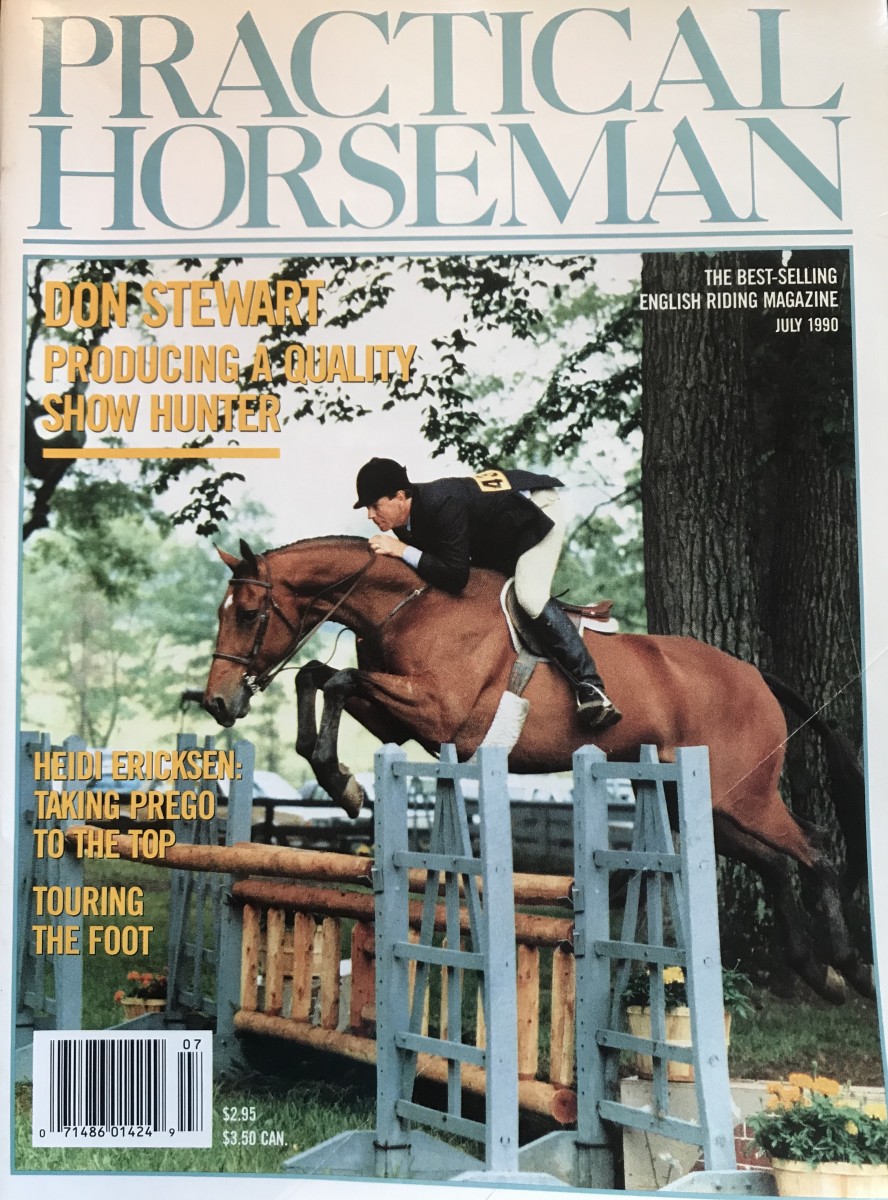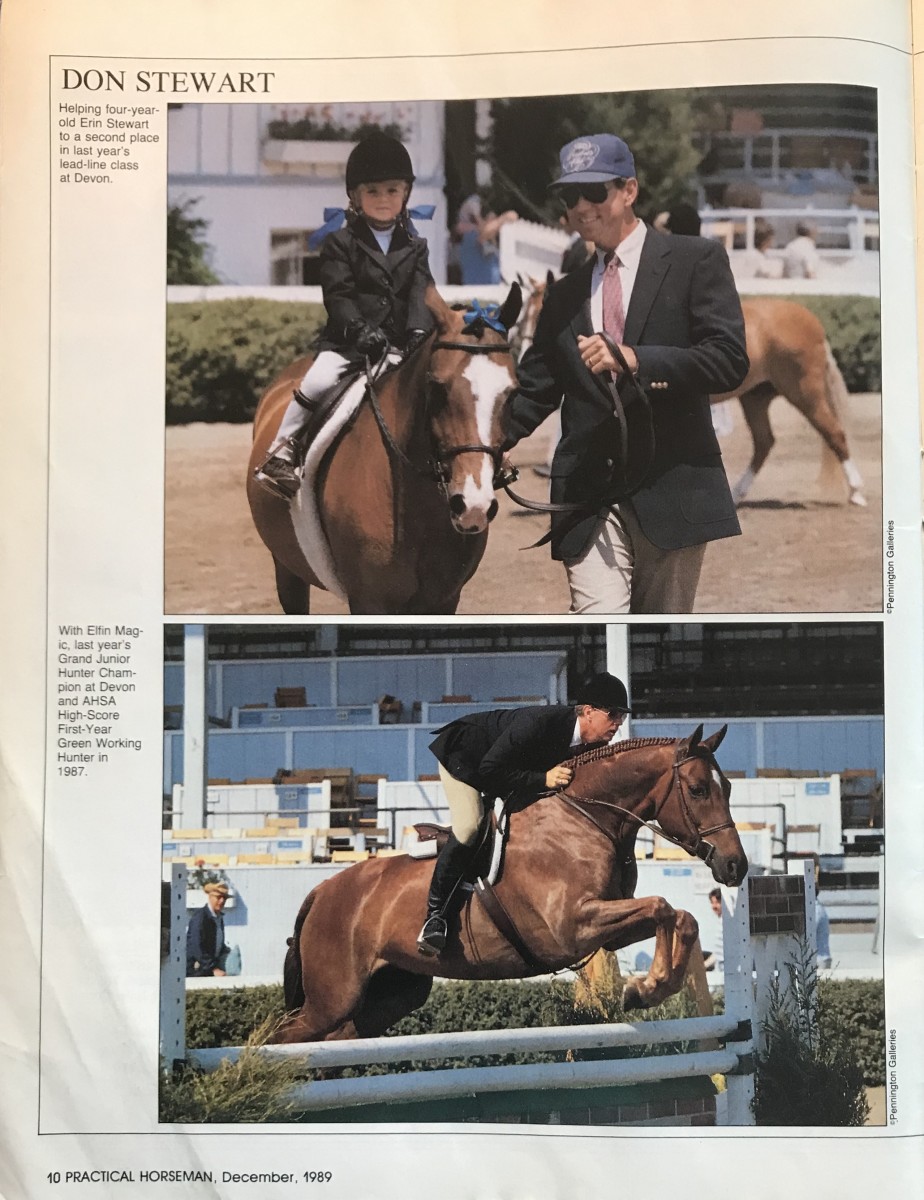Finding and developing horses who are good jumpers and good movers has been Don Stewart’s forte for 45 years in the business. During that time, he’s proven his expertise by winning innumerable championships as a rider and a coach at all the major shows, including Devon, the Pennsylvania National, the Washington International and at the National Horse Show.
As a rider, Don’s list of accomplishments is long and distinguished and includes:
• 1969 Virginia Hunter-Seat Equitation Championship
• American Horse Shows Association Horse of the Year titles in the 1980s and ’90s: Auspicious (1981, ’82, ’87 and ’88), his personal favorite two-time winner Without A Doubt, David Banner, Tommy John, Canadian Voyager, Phantasm, Case In Point, Leave Me A-Roan, Western Prospect, Elfin Magic and Heartstrings

• 1989 Grand Champion Green Hunter Title at Harrisburg riding Meant To Be
• 1989 World Cup Working-Hunter Classic riding Moment to Moment
• 1992 Leading Hunter Rider at the Devon Horse Show
• 1993 and 1995 Leading Hunter Rider at the National Horse Show
Although buying, showing and selling top hunters is a large part of Don’s business, he’s equally well known as a coach for junior and amateur riders. By the time he graduated with a Bachelor of Arts in history at North Carolina State University, he had enough students to open his own training facility.
Some of Don’s students’ notable wins include:
• AHSA/USEF Horse of the Year titles with junior horses including Nobel, Elfin Magic, Hilton, Dance Away, Fernwalk, Double Cinco, Cleopatra’s Smile and Northface. Horse of the Year ponies include Sassafrass Creek, Triville, Tickled Pink and For Kid’s Sake.
• Emily Williams won both the ASPCA Maclay National Championship and the USEF Hunter Seat Equitation Medal Final in 1999.
• Other Maclay winners are Kelly Farmer (1993), Sarah Milliren (2011) and Hunter Holloway (2016)
• Other Medal winners include Lauren Van Eldik, who had trained with Don since she was a Short Stirrup rider (2003); Meg O’Mara (2012); Spencer Smith (2014); and Kelli Cruciotti (2015).

During our interview, Don offered his proudest moment—when his daughter Erin won the 2002 ASPCA Maclay National Championship, which capped off a junior career that included the Grand and Junior Hunter Championship titles at the Washington International in 2001. For those efforts, she was named the competition’s Best Child Rider, a feat she repeated in 2002. She also earned Grand Championship titles at Devon and the National Horse Show.
As we chatted, Don’s sense of humor—well-known among friends and peers—came through when I asked him about his mentors, to which he replied with a chuckle, “Being a know-it-all myself, it’s kind of hard to act like I don’t know everything.” He said that he tried to associate himself with and emulate top riders such as Katie Prudent, Leslie Burr Howard, Michael Matz, Conrad Homfeld and Joe Fargis as well as distinguished Virginia horsemen, such as J. Arthur Reynolds and Frances Rowe. He says his biggest mentor was renowned horseman and judge Walter “Jimmy” Lee.
Don sold his business, Don Stewart Stables, in Ocala, Florida, in two years ago, though he is still developing and training horses and expanding into the jumper arena. He and his wife, Nancy, with whom he raised two children in addition to Erin—Don and Whitney—are still based in Ocala, Florida, where they rent a farm.
You can listen to the full interview wherever you listen to podcasts, but in the meantime, below is a snippet of our conversation.
As an Amazon Associate, Practical Horseman may earn an affiliate commission when you buy through links on our site. Product links are selected by Practical Horseman editors.
Did you ever get nervous as a rider? (11:00)
Oh yes, I got terribly nervous, but that’s what makes it fun for me was getting nervous and getting excited about it and learning to put your nerves, make them work for you instead of against you. I think if you weren’t worried or nervous, for me, it would take a lot of fun out of it and the thrill of winning, if you’re wound up a little bit about it. Otherwise, I would have slept through the classes.

How about your students, do you help them handle their nerves? (11:33)
Yes, but as much as I knew everything about everything, I do take a second seat and I have them talk to a sport psychologist, so I can stay out of that part of it, instead of acting like I know how to do all of that, I’d rather give the real experts their chance at it. I do try to play it down though when something goes wrong. I don’t make a … I try to move on. I don’t keep throwing that back and throwing that back at them. I figure as much as this costs, you might as well have a good time spending all this money. That’s our general attitude. I like to make it light and fun and at the same time develop your skills.
What do you look for in a good horse? (14:48)
I start at the feet. That to me is crucial. I don’t like buying horses whose feet don’t match. I want the good legs and a head. Back when I was younger, I didn’t think the head mattered that much, but they’re way easier to sell when they’re pretty. A pretty head and neck is way easier to market than a plain-headed horse with an upside down neck. Of course, I had to find that out through trial and error ’cause I can’t listen to anybody.
A pretty head and neck is a good start. I like an athletic horse, a horse whose knees come up, withers come up when he jumps. Some of these horses that have won World Cup Finals and huge classes but jump out of shape, I think they’re the exception. But you have to be careful when they’re looking because you might pass one up like that ’cause they don’t use their knees good. … There have been lots and lots, but one that comes to mind was that horse that Leslie Howard won so much on, Albany.
Basically, athletic. I like a big eye on a horse, a big shoulder. I don’t mind a little more slope in the pastern than you see a lot of these warmbloods have—those short, straight pasterns—I like a little longer pastern myself. Some of my best hunters were a little long in the pastern but they were very scopey, good-moving horses. Color doesn’t really matter. I like dark brown myself, but I don’t really care what color they are.

Do you have a favorite exercise or type of work that you like to teach your students? (17:50)
We spend a lot of time cantering cavalletti without stirrups on different patterns. That would be my favorite exercise. Playing with the distances and the strides between them. Learning the automatic release where their balance is developed without the stirrups. That’s a dying art. You only see it in the Olympics and with the really top riders.
You’re a judge as well. What do you like and dislike about being a judge? (18:23)
I dislike that you can’t pin everybody first to keep them all happy. I know the majority of the people and I try to do a good job. If you do it like you see it, everybody’s sort of going to get their turn. You can’t play favorites. It’s too black and white. There’s not that much gray area. The money is not that good so I certainly don’t do it for the money, but I feel like I owe it to the industry. Like I said, being a know it all and having judged—heck I judged Devon in ’81 an ’83, that was a hundred years ago. I try to do a few shows to try to get around, see different parts of the country. I think it’s a little bit an obligation. It’s a shame when you don’t have other top trainers who that will do the judging.






